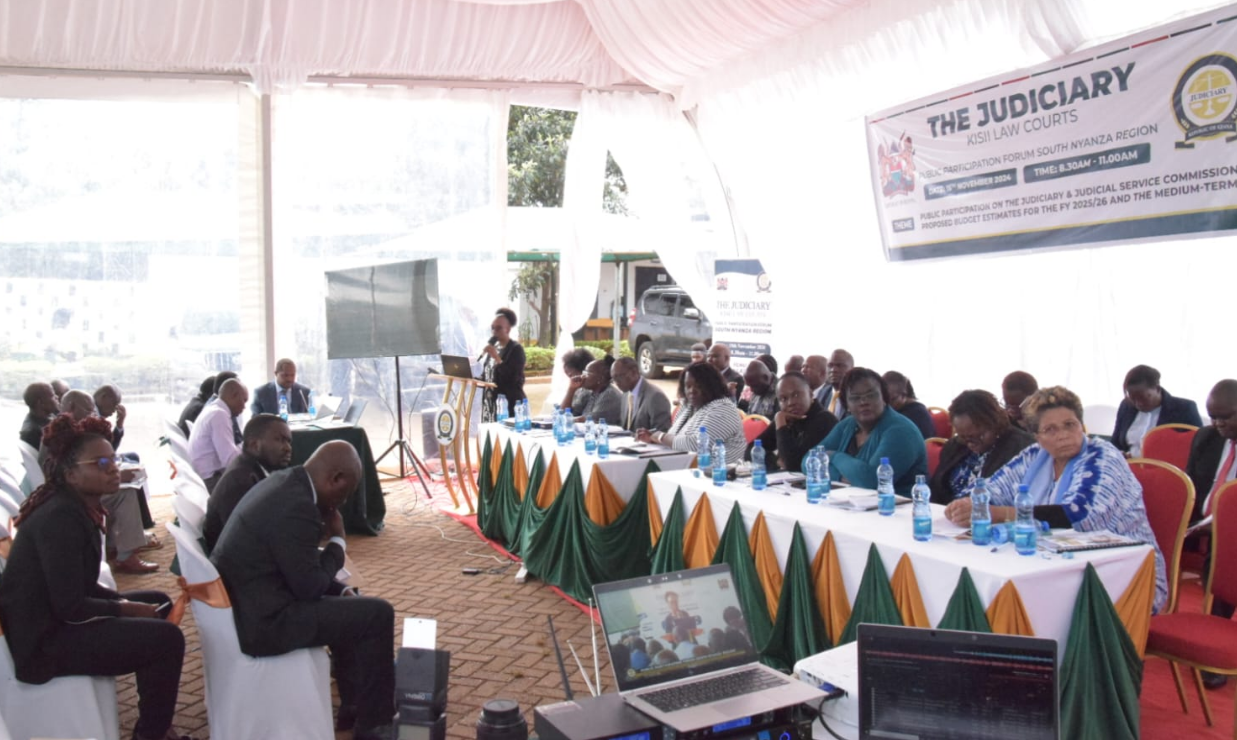

The Judiciary has outlined priority areas it seeks to
implement in the next financial year in fulfillment of its vision to create a
strong institution that is independent, accessible, efficient, and one that
protects the rights of all especially the vulnerable.
Chief Registrar of the Judiciary Winfridah Mokaya, says this
includes automation of services, expansion of people-centered justice
initiatives such as Alternative Justice Systems (AJS), Court Annexed Mediation
(CAM), specialised courts and establishment of more courts and sub-registries.
She adds that the Judiciary will also seek to finance court
operations as well as ongoing capital projects.
“The resources required for the Judiciary to undertake the
above key priorities in financial year 2025-26 is Sh40.1 billion, comprising
Sh31.6 billion for recurrent expenditure and Sh8.5 billion for the development.
However, the annual indicative budget proposal for the Judiciary is Sh24.937
billion, out of which Sh23.437 billion is recurrent while Sh1.5 billion is
development,” Mokaya said.
She added the Judicial Service Commission (JSC), on the other
hand requires Sh1.932 billion to implement priorities for the 2025–26 financial
year as outlined in its Strategic Plan 2022–2027.
The Chief Registrar explained that as a result, the
Judiciary is left with a funding gap of Sh15.159 billion, which translates to
38 per cent, while the funding deficit for JSC is Sh1.1bn (57 per cent).
This, she said, is considering the current JSC’s indicative
budget allocation of Sh821m.
Mokaya underscored the need for the centrality of financial
independence in the attainment of Judiciary’s vision.
“As we continue engaging the relevant institutions for
enhanced funding for both the Judiciary and JSC, we must carefully prioritise
the services to be delivered to the public using the available resources,” the
CRJ said.
The Chief Registrar was speaking on Tuesday during a public
participation exercise in Isiolo on the proposed Judiciary budget estimates
for the 2025-26 financial year and the medium-term period covering 2025-26 and
2027-28.
In a speech read on her behalf by Registrar of Tribunals Hon
Anne Asugah, Mokaya said the engagement was being undertaken together with the
JSC.
The event was also attended by Meru High Court presiding
Judge, Edward Muriithi, who was standing in for the Isiolo High Court presiding
Judge, Lady Justice Thripsisa Cherere.
Mokaya said the Judiciary was not holding the engagement to
merely fulfill the legal requirement under the constitution and the Public
Finance Management Act, but in recognition of duty to be open to scrutiny and
accountability and with a genuine desire to receive feedback.
Her sentiments were echoed by Isiolo Law Courts Chief Magistrate,
Lucy Mutai, who noted that the public participation underscored the right of
citizens to take part in the decisions that affect their lives and the
governance of their nation.
She said through public participation on Judiciary’s
budgeting, the institution seeks to promote ownership of its operations by the
people it serves.
“Your contributions will help ensure that Judiciary is
adequately resourced to address case backlogs, protect the rights of vulnerable
groups, and deliver justice without undue delay.”
Magistrate Mutai added that the views will guide the
Judiciary in ensuring equitable allocation of resources to marginalised areas,
a goal she noted, aligns with Judiciary’s constitutional mandate.
“By involving stakeholders, we are reaffirming our commitment to delivering accessible, efficient and effective justice services that address the needs of all Kenyans,” Mutai said.
The public participation exercise was on Wednesday taken to Kisii in an event attended by JSC commissioners and Judges led by Kisii Law Courts presiding Judge, Sila Munyao, Judiciary's Director of Finance, Beatrice Kamau, Registrar High Court, Hon Clara Otieno, as well as stakeholders in the justice sector and members of public.








